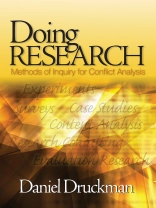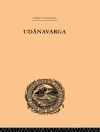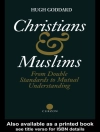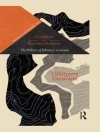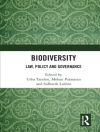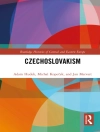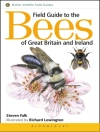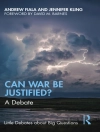Winner of the 2006 outstanding book award (for books published in 2004-2005) from the International Association for Conflict Management at their annual meeting held in Montreal!
An award-winning book, Doing Research is a must read. Designed for students across a variety of social science disciplines, it is the first research methods text devoted to conflict analysis and resolution. It begins with a discussion of the philosophical foundations for doing research, providing guidelines on how to develop research questions and how these questions can be addressed with various methodologies. The book presents a wide-ranging treatment of both quantitative and qualitative approaches to the design and analysis of problems of conflict.
The approaches covered include experiments, simulations and models, surveys, single and comparative case studies, ethnographies, content analysis, narrative analysis, evaluation research, action research, and research consulting. These approaches come alive in a variety of applications culled from the published literature. A concluding chapter provides an integration of the various methodologies, including their complementary strengths. Throughout the book, author Daniel Druckman illustrates the value of a multi-method approach to doing research on conflict analysis and more generally across the social sciences.
Key Features
- Guides readers through how to do literature reviews and ask research questions, easing students into the research process
- Weaves together qualitative and quantitative, as well as deductive and inductive, approaches to analysis, allowing for the widest possible diversity in methodology
- Includes numerous examples from published articles and dissertations and a discussion of research consulting
Doing Research is perfectly suited as a text for research methods courses across the social sciences, especially those dealing with conflict analysis in departments of political science, communication, psychology, sociology, and management. Professional researchers and consultants will also want to add this book to their libraries for guidance on multi-method techniques.
‘This is an extremely important book for our field because it is the first research methods book that focuses on techniques that are common in this area but transcends disciplines. I am confident that the book will be used widely in our field because it is both practical and engaging.’
— William A. Donohoe, Michigan State University
‘Doing Research is a gem. It provides multiple research methods and models focusing on conflict analysis and resolution that can be used by any student in a variety of social science disciplines or fields of study. I wish this book had been written 20 years ago.’
—Brian Polkinghorn, Salisbury State University
‘Doing Research is the most widely acclaimed book on research methods for conflict resolution students to appear in recent years. The book provides a wonderfully rich array of ideas about ways to do research for both the scholar and practitioner–pracademic–enriching the analysis and practice in the conflict resolution field. The author has a diverse intellectual background and his wide-ranging research experience informs the contributions made by this book to conflict analysis and resolution and to related social-science fields.’
—Sean Byrne, University of Manitoba
Tabla de materias
Preface
Prologue
Doing Research on Conflict
Part Introduction
Why Do Research?
Research Foundations: Debating Points
Research Motivations, Assumptions, Questions
Some Contributions from Research on Conflict
Discussion Questions
Getting Started to Do Research
Where Ideas Come From
Choosing a Research Topic
Alternative Methodological Approaches
Choosing an Approach
Discussion Questions
Performing Experiments
Part Introduction
Designing Experiments and Conducting Simulations
The Experimental Method: An Overview
Internal and External Validity
Experimental Designs: Examples from CA&R
Summary
Discussion Questions
Evaluating Data from Experiments: Methods of Analysis
Essential Ideas of Statistical Analysis
Measurement and Statistical Power: Two-Group Designs
Measurement and Power: Three-Group Designs
Factorial Designs
Repeated Measures and Other ANOVA Designs
Summary
Discussion Questions
Designing and Conducting Surveys
Part Introduction
Survey Research
Overview
Survey Research Design
Measurement
Sampling
Data Collection
Ethics
Conclusions
Discussion Questions
Doing Case-Based Research
The Case-Study Method: An Overview
Enhanced-Case and Time Series Analyses
Theory and the Case Study
Time-Series Designs and Analyses
Systematic Expert Judgment
Qualitative Time-Series Analysis
Summary
Comparative Case Study Approaches
Focussed Case Comparisons
Aggregate Case Comparisons
Discussion Questions
Writing Ethnographies
Part Introduction
Ethnographic Methods
What is Ethnography?
Why do Ethnography?
The Logic of Ethnography
Making Sense of Other Worlds
Taking Notes
The Ethnographer′s Tool Kit
Discussion Questions
Analyzing Documents: Texts and Process Analysis
Part Introduction
Content Analysis
Overview of the Approach
Technical Issues for the Content Analyst
Content Analysis Applications
Discussion Questions
Narrative Analysis
Overview of the Approach
Narrative Theory
Analysis of Narratives
Discussion Questions
Evaluating Interventions and Applying Research
Part Introduction
Evaluation Research
Challenges of Evaluation
Tasks in an Evaluation Project
Evaluation Issues
Evaluating Interventions: An Example of a Framework
Discussion Questions
Research for Action and Consulting
Basic and Applied Research
Action Research
Research Consulting
Discussion Questions
Concluding
Part Introduction
From Philosophies to Research Methods: The Value of Doing Research in Conflict Analysis and Resolution
Doing Research: Philosophies and Methodologies
Research Issues
Summary of Methods Covered
Comparing the Methodologies: Experiments, Surveys, and Case Studies
Types of Data
Wrapping Up
Epilogue
References
Sobre el autor
Daniel Druckman is a 2004-2005 visiting Professor at the University of Queensland′s Australian Centre for Peace and Conflict Studies in Brisbane, Australia. He is the Vernon M. and Minnie I. Lynch Professor of Conflict Resolution at George Mason University in Fairfax, Virginia, where he has coordinated the doctoral program at the Institute for Conflict Analysis and Resolution (ICAR). He is also a member of the faculty at Sabanci University in Istanbul, Turkey and has held senior positions at several consulting firms, as well as at the U.S. National Academy of Sciences. He received a Ph.D. from Northwestern University and was awarded a best-in-field prize from the American Institutes for Research for his doctoral dissertation. He has published widely (approximately 150 publications, including 12 authored or edited books) on such topics as negotiating behavior, nationalism and group identity, human performance, peacekeeping, political stability, nonverbal communication, and methodology (including simulation). He serves as a board member or associate editor for eight Journals. He received the 1995 Otto Klineberg award for Intercultural and International Relations from the Society for the Psychological Analysis of Social Issues for his work on nationalism, a Teaching Excellence award in 1998 from George Mason University, and an award for the outstanding article published in 2001 from the International Association for Conflict Management. He is the recipient of the 2003 Lifetime Achievement award from the International Association for Conflict Management.
